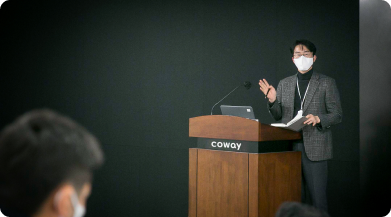- Governance /
- Risk Management
Coway operates a company-wide risk management system by classifying risks that may arise from business activities into financial and non-financial risks, and is supervised by the relevant BOD committees and business divisions according to their types and materiality.
The financial risks related to market, credit, and liquidity are monitored by the Finance Department, while non-financial risks are supervised by the Infinite Responsibility Committee and the ESG Committee, respectively. The financial and non-financial risk management organizations are responsible for monitoring and identifying risks on a regular basis, operating a risk monitoring system designed to analyze the impact of each risk factor, and reporting the results to the Management Committee. Then, Coway takes firmwide actions by taking the impact and urgency of each risk into consideration.
The unpredictability of the financial markets is important for financial risk management. We seek to identify, assess, and avoid financial risks and eliminate the risk factors that potentially have negative impacts on our financial achievements. Financial risks consist of market risks, credit risks, liquidity risks, and capital risks.
Coway launched the ESG Committee under the BOD to manage and supervise ESG risks related to ethics, environment, labor, human rights, and supply chain, etc. We also formed an ESG Consultative Group and ESG Working Group under the ESG Committee to monitor non-financial risks in each area and report important risks to the ESG Committee on a regular basis. For product quality and safety, we operate the Infinite Responsibility Committee under direct control of the CEO to discuss issues related to product quality and safety.
In June 2021, Coway established the ESG Consultative Group to enhance the long-term value of the company and promote sustainability management in a more strategic and efficient manner. The ESG Consultative Group is responsible for managing and monitoring key environmental (E), social (S) and governance (G) strategies and issues, and serves as a body to improve corporate transparency.
It is held on a quarterly basis to identify major issues that may affect corporate sustainability in advance and discuss responses.
The group is composed of the ESG team (IR Team) and relevant departments by area, and discusses ESG issues among working groups, proposes reports and agendas, and checks performance through monitoring.

Category
Key Agenda
1st
(2022.01)
2nd
(2022.05)
3rd
(2022.11)
We monitor and analyze risks that can potentially affect our business environment significantly from mid- to long-term perspectives, to take appropriate actions strategically and preemptively. In 2022, we identified the emerging risks as “Addressing climate change adaptation" and "Enhancing green products and technologies".
Emerging risks
Risk context and impacts on business
Approach to risks
Addressing climate change adaptation
As risks caused by climate change adaptation pose serious threats to the world, socially and environmentally, many nations are taking tougher measures to address climate change adaptation and regulate global warming. Korea enacted the Framework Act on Carbon Neutrality and Green Growth in 2021, setting the national goal, “Carbon Neutrality by 2050”. Korea is the 14th nation to legislate its vision for carbon neutrality by 2050. It made a public pledge to cut greenhouse gas emissions by 40 percent by 2030 compared to 2018 as a mid- to long-term goal. The achievement of the Nationally Determined Contribution (NDC) requires determined efforts to reduce greenhouse gas emissions by businesses and industries. Businesses should make consistent investment for greenhouse gas emissions reduction not only in their own realm of business activities, but also in the supply chain and the external realm it has impacts on.
As the greenhouse gases we generate are indirect greenhouse gases (scope 2) emitted mostly from electricity, we can mitigate related risks by actively investing in energy efficiency and transition to renewable energy.
Coway undertakes diverse activities to fulfill the goal it set in 2021 to cut greenhouse gas emissions. We formulated a new roadmap for the phased reduction of greenhouse gas emissions by 2030 and 2040, respectively, to achieve carbon neutrality by 2050.
Although we do not produce a large amount of absolute greenhouse gas emissions and we are not subject to direct government regulation, we continue to carry out diverse activities to reduce greenhouse gas emissions in the entire process from production to use and disposal. As a medium-term goal, we plan to reduce 50% of our 2020 GHG emissions by 2030, 75% by 2040, and 100% by 2050.
Enhancing eco-friendly products and technologies
As companies become more environmentally responsible, the green market grew to KRW 30 trillion in 2020 and is expected to grow further in 2022 and 2023.
This is a trend that has been shaped by the increased level of environmental awareness during the COVID-19 pandemic, highlighted by countries announcing carbon neutrality goals and environmental regulations such as plastic bans.
Eco-friendly products and technologies can be perceived as a solution to these problems. This offers the possibility of creating new market opportunities and developing new revenue streams.
In order to comply with these rules and regulations, Coway is expanding eco-friendly certified products based on active Research and development investment and securing technological competitiveness.
We consider the environment from product planning and actively incorporate eco-friendly materials and technologies in our designs to achieve eco-friendly management.
Coway's icon water purifier series is one of the leading eco-friendly products as it utilizes semiconductor thermoelectric elements, a method of cooling by absorbing ambient heat without using refrigerants, which are considered to be the main cause of environmental pollution.
In this way, Coway was able to read the changes in the market and gain an edge over the competition through the development of innovative products. In addition, the company was able to improve its market competitiveness due to the strengthening of its brand image and the increase in customer preference due to its sustainability strategy.